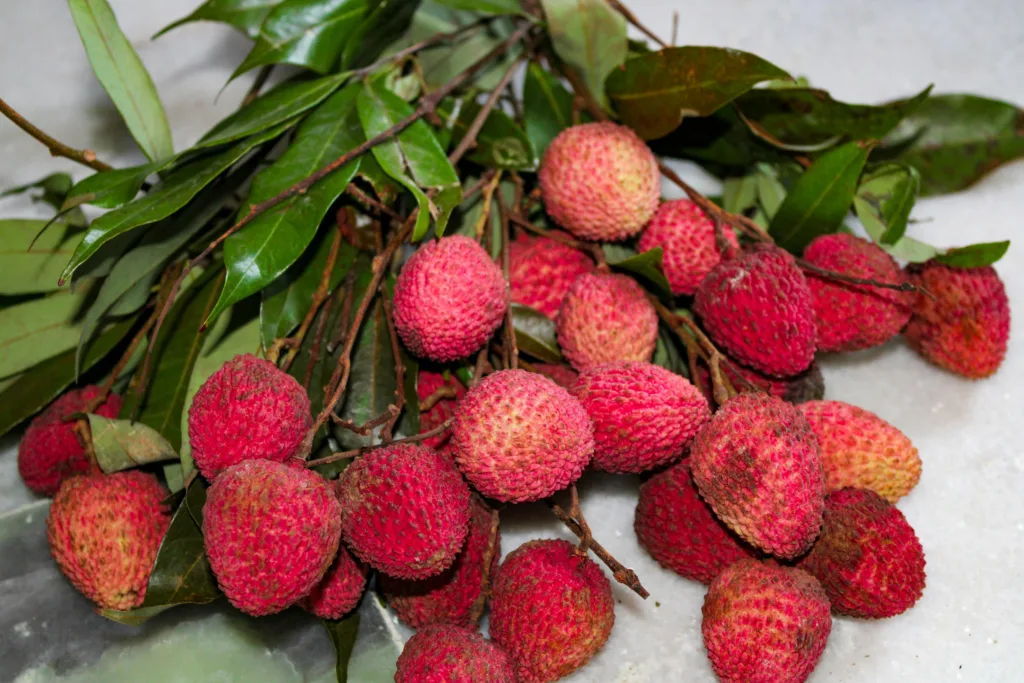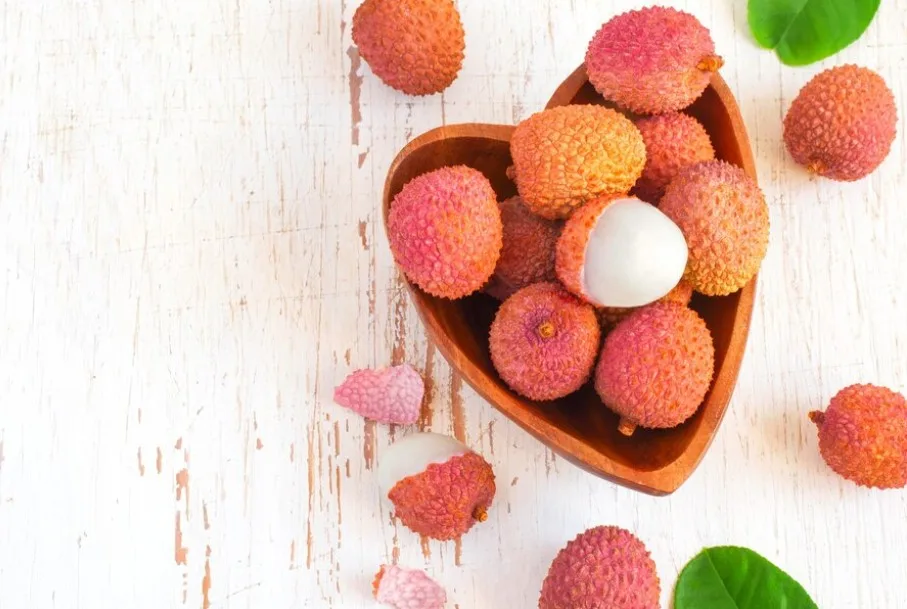Lychee, a tropical fruit native to the Guangdong and Fujian provinces of China, has gained worldwide popularity for its sweet, aromatic flavor and numerous health benefits. This small, round fruit, covered with a rough, red rind, is not only a delight to the taste buds but also a powerhouse of essential nutrients. In this article, we will explore the various health benefits and uses of lychee, shedding light on why it should be a part of your regular diet.
Nutritional Profile of Lychee
Lychee is rich in essential vitamins, minerals, and antioxidants. A 100-gram serving of lychee provides:
- Calories: 66
- Carbohydrates: 16.5 grams
- Fiber: 1.3 grams
- Vitamin C: 71.5 mg (119% of the daily recommended intake)
- Vitamin B6: 0.1 mg
- Folate: 14 micrograms
- Potassium: 171 mg
- Magnesium: 10 mg
This impressive nutritional profile contributes to the myriad health benefits of lychee.

Health Benefits of Lychee
1. Boosts Immune System
One of the standout benefits of lychee is its high vitamin C content. Vitamin C is a potent antioxidant that helps protect the body against infections by boosting the immune system. Regular consumption of lychee can enhance the body’s ability to fight off colds, flu, and other infections.
2. Promotes Healthy Skin
Lychee is a rich source of antioxidants, such as vitamin C, which play a crucial role in skin health. Antioxidants combat free radicals, which can damage skin cells and lead to premature aging. The high water content in lychee also helps in keeping the skin hydrated, contributing to a youthful and radiant appearance.
3. Supports Cardiovascular Health
Lychee contains heart-healthy nutrients like potassium and fiber. Potassium helps regulate blood pressure by balancing sodium levels in the body, reducing the risk of hypertension. Fiber aids in lowering cholesterol levels, promoting heart health. Additionally, the antioxidants in lychee help reduce oxidative stress, which can lead to cardiovascular diseases.
4. Aids Digestion
Dietary fiber is essential for a healthy digestive system, and lychee provides a good amount of it. Fiber adds bulk to the stool, facilitating regular bowel movements and preventing constipation. Moreover, the water content in lychee helps in maintaining optimal hydration, which is crucial for digestive health.
5. Enhances Blood Circulation
Lychee is known to improve blood circulation due to the presence of various essential nutrients, including magnesium, copper, iron, vitamin C, manganese, and folate. These nutrients are critical for the production and circulation of blood. Better blood circulation ensures that oxygen and nutrients are efficiently delivered to all parts of the body, promoting overall health.
6. Provides Anti-Inflammatory Benefits
The flavonoids and antioxidants in lychee, such as quercetin and kaempferol, possess anti-inflammatory properties. These compounds help reduce inflammation in the body, which can alleviate symptoms of inflammatory conditions like arthritis and heart disease.
7. Supports Weight Management
Lychee is a low-calorie fruit that is high in water content, making it an excellent choice for those looking to manage their weight. The dietary fiber in lychee helps you feel full for longer, reducing overall calorie intake and aiding in weight loss efforts.
8. Improves Bone Health
Lychee contains essential nutrients like magnesium, phosphorus, iron, manganese, and copper, which are vital for maintaining strong and healthy bones. Regular consumption of lychee can help prevent bone-related disorders and improve bone density.
9. Prevents Anemia
Iron and folate are crucial for the production of red blood cells. Lychee, being a good source of these nutrients, can help prevent anemia by ensuring an adequate production of healthy red blood cells. Anemia prevention leads to improved energy levels and overall vitality.
10. Regulates Blood Sugar Levels
While lychee is naturally sweet, it has a low glycemic index, meaning it does not cause rapid spikes in blood sugar levels. The fiber content also helps regulate blood sugar by slowing down the absorption of sugar into the bloodstream. This makes lychee a suitable fruit for people with diabetes when consumed in moderation.
11. Enhances Cognitive Function
Lychee contains several B vitamins, including vitamin B6, which are known to support brain health. These vitamins help in the production of neurotransmitters that regulate mood and cognitive functions. Regular consumption of lychee can aid in improving memory and reducing the risk of cognitive decline.
12. Provides Anti-Cancer Properties
Research suggests that the polyphenolic compounds found in lychee have anti-cancer properties. These compounds, such as flavonoids and antioxidants, help inhibit the growth of cancer cells and protect the body against various types of cancer.
13. Supports Eye Health
Lychee contains essential nutrients like vitamin C, vitamin E, and phytonutrients that contribute to eye health. These nutrients help protect the eyes from oxidative stress and reduce the risk of cataracts and other age-related eye conditions.

Uses of Lychee in Culinary Practices
Lychee is a versatile fruit that can be enjoyed in various ways. Here are some popular uses of lychee in culinary practices:
Fresh Consumption
The most common way to enjoy lychee is by consuming it fresh. Simply peel off the rind and remove the seed to savor the juicy flesh. Fresh lychee can be a refreshing snack on a hot day.
Lychee Juice and Smoothies
Lychee juice is a popular beverage, known for its sweet and tangy flavor. It can be consumed on its own or blended with other fruits to create delicious smoothies. Lychee pairs well with tropical fruits like mango, pineapple, and coconut.
Desserts and Sweets
Lychee is often used in desserts, such as ice creams, sorbets, jellies, and puddings. Its unique flavor adds an exotic touch to these sweet treats. Lychee can also be used as a topping for yogurt and pancakes.
Salads
Adding lychee to fruit or green salads can enhance their flavor and nutritional value. Lychee complements a variety of ingredients, including leafy greens, nuts, and other fruits.
Cooking
Lychee can be incorporated into savory dishes as well. It is used in Asian cuisines, particularly in Chinese and Thai dishes. Lychee can be added to stir-fries, curries, and seafood dishes, imparting a sweet and aromatic flavor.
Conclusion
Lychee is more than just a delicious fruit; it is packed with numerous health benefits that can contribute to overall well-being. From boosting the immune system and promoting skin health to supporting cardiovascular health and aiding digestion, lychee is a valuable addition to a healthy diet. Its versatility in culinary uses further adds to its appeal, making it easy to incorporate into various dishes. By including lychee in your regular diet, you can enjoy its delightful taste while reaping its extensive health benefits.
Topics covered
- What is Lychee?
- What are key nutrients in Lychee?
- What are health benefits of Lychee?
- What are uses of Lychee?
- How to Use Lychee?








6 thoughts on “Lychee: The Sweet Fruit Packed with incredible Health Benefits”